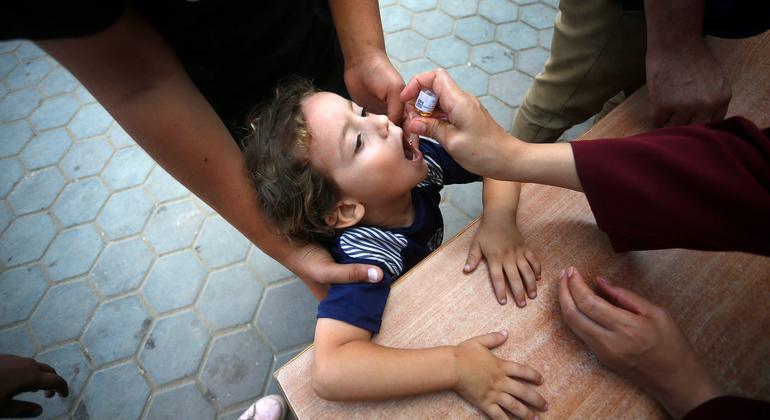Hours after the campaign rolled out, reports indicated that a health center in the north had been hit, injuring six people, including four children, in a place where there had been a humanitarian pause, according to the head of the World Health Organization (WHO) . .
“We have received an extremely worrying report that the Sheikh Radwan Primary Health Center in northern Gaza was hit today while parents were bringing their children for the life-saving polio vaccination in an area where a humanitarian pause was agreed to allow vaccination to continue ,” Tedros Adhanom Ghebreyesus said in a social media post.
He said a WHO team was on the scene just before.
“This attack, during humanitarian pause, endangers the sanctity of health protection for children and may deter parents from bringing their children for vaccination,” he said. “These vital humanitarian area-specific pauses must absolutely be respected.”
The campaign rolls out despite challenges
“To overcome challenges posed by the volatile security situation and constant population movements, robust micro-plans have been developed to ensure that the campaign is responsive to the significant population shifts and displacement in the north following the first round in September,” the UN health agencies said. , WHO, and for children, UNICEF, said in a statement.
UN agencies and partners began phase one in September and have had more than 200 teams on standby since October 23 to carry out the final round of the campaign, which had been delayed by constant Israeli airstrikes, clashes on the ground and no assurances that the necessary humanitarian efforts. breaks to stop fighting during the delivery of the vaccines.
Polio was eradicated in the Gaza Strip 25 years ago, but the ongoing war has sparked several health crises, with a 10-month-old diagnosed with the crippling virus earlier this year, prompting health authorities to organize a campaign in the war-torn Israeli occupation area.
Restrictions continue
The campaign will be delivered by 216 teams across 106 fixed sites, 22 of which have been added to ensure increased availability of vaccination in areas where recently displaced people are seeking refuge, according to UN agencies. There will also be 209 social “mobilisers” deployed to engage communities and raise awareness about vaccination efforts, they explained.
However, the agencies warned that health workers will not be able to reach all the children who need a final dose of the vaccine.
“The final phase of the campaign aimed to reach an estimated 119,000 children under the age of 10 in northern Gaza with a second dose of new oral polio vaccine type 2 (nOPV2), but reaching this goal is now unlikely due to access restrictions,” the agencies warned .
Despite the lack of access to all eligible children in northern Gaza, the Polio Technical Committee for Gaza, which includes the Palestinian Ministry of Health, WHO, UNICEF, the UN Agency for Palestine Refugees, UNRWA and partners, decided to resume the campaign.
The plan aims to reduce the risk of a long delay in reaching as many children as possible with polio vaccines and the possibility of vaccinating those recently evacuated to Gaza City from other parts of the northern strip.
Extended humanitarian pauses
The time period for the humanitarian breaks has been extended by two hours and is expected to run from 6am to 4pm daily, WHO and UNICEF said. As in the first two phases, vitamin A will also be given together to children between the ages of two and 10 in the north to help boost general immunity.
The campaign in northern Gaza follows the successful implementation of the first two phases of the second round in central and southern Gaza, which reached 451,216 children – 96 percent of the target in these areas.
A total of 364,306 children between the ages of 2 and 10 have received vitamin A so far in this round.
Regional impact
To interrupt poliovirus transmission, at least 90 percent of all children in all communities and neighborhoods must be vaccinated, which will be challenging to achieve given the situation, the agencies said.
A delay in the administration of a second dose of nOPV2 within six weeks reduces the effect of two closely spaced rounds, reducing immunity, according to the UN health agency.
The WHO has also warned that a significant number of children missing their second vaccine dose is seriously jeopardizing efforts to stop the transmission of the virus and could also lead to additional cases in the Gaza Strip and neighboring countries.
Watch UN Video’s news flash on phase two of the polio vaccine campaign in Gaza:



